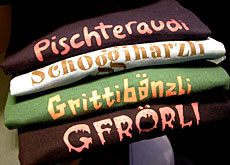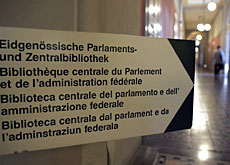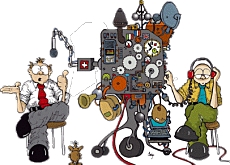Forum addresses Swiss-German concerns

In German-speaking Switzerland dialect is going from strength to strength, but Forum Helveticum warns that this threatens the country's cohesion.
Switzerland’s minority communities regret the eclipse of standard German, while educationalists are concerned by a loss of linguistic competence on the part of German speakers.
Forum Helveticum, a platform for discussion of current issues in Swiss public life, has returned to the “language question”. This time, however, the issue is not whether pupils should first be taught English or a second national language, but the role of dialects, in particular Schwytzerdütsch (Swiss-German).
The forum has published a pamphlet, in French and German, entitled “Dialect in (German-speaking) Switzerland – The conflict between local identity and national cohesion”.
This highlights the drawbacks of using Schwytzerdütsch, which consists of many related, non-standardised dialects, in German-speaking Switzerland, where it plays a more important role than in other parts of the country.
Although using Schwytzerdütsch strengthens local identity, it results in increasing numbers of young people not being able to express themselves competently in the language of Goethe. It also threatens to isolate German-speaking Swiss within Switzerland and internationally.
Communication problems
For outsiders, learning Schwytzerdütsch is difficult because of its diversity, because it does not open the door to a great literary heritage and because school textbooks teach standard German rather than the Schwytzerdütsch dialect.
This might explain the frustration of Switzerland’s minorities – especially the French and Italian-speaking communities – who feel excluded when they try to mix with dialect-speaking German Swiss.
“But let’s not blow this out of proportion,” says Beat Siebenhaar, a linguist who has researched the dialects of German-speaking Switzerland.
“People arriving here have to come to terms with the local language and the spoken language is Schwytzerdütsch. But people also know and speak standard German – maybe not so fluently, but they do speak it.”
The right approach in other words is to communicate and not always wait for someone on the other side of the language divide to make the first move.
Neighbours
The unease felt by Switzerland’s minority communities and German-speaking Switzerland’s weariness of criticism partly explains why the publication has been widely discussed in the French and Italian-Swiss press but largely ignored elsewhere.
“I think French-speaking Swiss suffer more as a result of this communication problem,” linguist Anne-Claude Berthoud, president of the Swiss Academy of Moral and Social Sciences, told swissinfo.
The problem is more political than linguistic, she says, and of course “the aim is not to devalue dialect but to help to give it its rightful place, which is not total domination. Schwytzerdütsch needs to be placed in a wider context.”
The wider context is the European context, where, with a good command of a standard language German-speaking Swiss would feel more at home and be able to communicate with their neighbours more easily.
For Beat Siebenhaar the problem is not so much one of communication between individuals who do not speak the same language, “but rather the loss of competence in the standard language”.
Father tongue
The problem of inadequate linguistic competence was also highlighted by the international Pisa survey, which showed that young people in German-speaking Switzerland had difficulty in understanding a written text in German.
“I think it is important to take action,” concludes Anne-Claude Berthoud. “We need to give German-Swiss primary school pupils the opportunity to reach a good level in standard German, which is part of their culture.
“If they become detached from their Germanic cultural heritage, they will be on the slippery slope to an impersonal global culture.”
In other words, the German-speaking Swiss would lose a parent and would no longer be able to say, as the Swiss author and dramatist Friedrich Dürrenmatt did: “Swiss-German is my mother tongue, German is my father tongue”.
swissinfo, Doris Lucini
63.7% of the Swiss population claims German as their main language (Swiss-German dialect is their spoken language, while standard German is the language they write in).
20.4%: French
6.5%: Italian
0.5%: Romansh
9%: other languages (2000 census data)
There are many variants of Schwytzerdütsch but a handful dominate the linguistic landscape.
Forum Helveticum, a platform to discuss Swiss social, political and cultural developments, has published a pamphlet entitled “Dialect in (German-speaking) Switzerland – The conflict between local identity and national cohesion”.
The authors tackle the problems associated with the increasingly widespread use of dialect in German-speaking Switzerland: a loss of competence in standard German; problems in the workplace; international isolation; difficulties in communicating with the country’s linguistic minorities.
The publication – in German and French – can be obtained free from Forum Helveticum.

In compliance with the JTI standards
More: SWI swissinfo.ch certified by the Journalism Trust Initiative



You can find an overview of ongoing debates with our journalists here. Please join us!
If you want to start a conversation about a topic raised in this article or want to report factual errors, email us at english@swissinfo.ch.